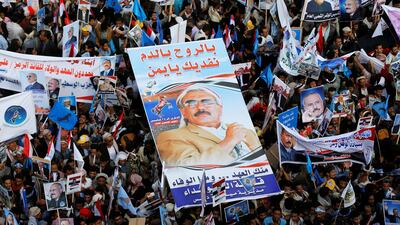Thousands attended a rally in Sanaa to celebrate the 35-year anniversary of former Yemeni president Ali Abdullah Saleh's political party on Thursday, flouting a ban on such activity issued by the country's Houthi rebels days before.
Local media reported that clashes had broken out between Houthi fighters and supporters of the General People's Congress (GPC) party at the rally in central Al Sabeen Square, but this was disputed by a Sanaa resident who attended the rally and other sources who spoke to The National.
"There were not forces of the Houthis near Al Sabeen and we did not hear any clashes near there," said Nouradeen Al Otomi, who attended the rally.
"We do not want to witness clashes between Saleh and the Houthis because civilians will be the main victims," he added.
_______________
Read more:
Yemen's Houthis declare 'emergency state' in Sanaa
Cracks emerge in Houthis-Saleh alliance
Yemen humanitarian crisis: How cholera outbreak is adding to country's woes
_______________
The rally came after the Houthis on Tuesday declared a state of emergency in the rebel-held capital, issuing a ban on partisan activities from taking place. They warned Mr Saleh, until now their main ally in the country's war, that he would "bear the consequences" after calling the Iran-backed rebels "militias" in a speech on Sunday.
Despite the warning, Mr Saleh gave a speech at the rally — albeit a rushed one lasting around five minutes — in which he said the GPC was ready to resist unspecified "enemies".
"We are ready provide the vanguard with thousands of fighters, ready to go at a moment," he told the crowds in Al Sabeen Square, many of whom had travelled to Sanaa from other provinces to attend the rally.
A broadcast of the speech by the GPC’s news agency showed no signs of violence.
Sky News Arabia reported that tens of thousands of people fled the rally once the speech was over, however, after Houthi fighters used "force" on them. It broadcast video of hundreds of GPC supporters running through the crowds gathered at the square.
Earlier in the day, local media reported that Houthi fighters were confiscating cameras in Al Sabeen Square and had arrested a number of pro-Saleh journalists as they tried to enter. Paths leading to the square were blocked off by the Houthis ahead of Mr Saleh's speech, reports said, preventing many supporters from reaching the rally.
According to Sky News Arabia, rebel fighters also detained hundreds of GPC supporters in Rima province, west of Sanaa.
Though Houthi supporters protested outside of the rally in Sanaa, Mr Al Otomi said there were no rebel fighters at Al Sabeen Square. Instead, he said, Yemeni soldiers were posted at the entrances to the square, checking everyone who entered.
The Houthi movement entered an alliance with Mr Saleh and renegade soldiers loyal to him to fight the government of Yemeni president Abdrabu Mansur Hadi and the Saudi-led military coalition supporting it.
But relations between the rebels and Mr Saleh deteriorated earlier this week, after speeches from both sides accused the other of jeopardising their partnership.
"Differences between the two sides are nothing new," said professor April Longley Alley, a senior analyst focusing on the Arabian peninsula at the International Crisis Group.
"The Houthis and Saleh temporarily are bound together by common opposition to the Saudi-led coalition. But they are historical enemies and their co-operation in the government and on military fronts is fraught with difficulties."
The Houthis fought six brutal wars in five years with the Yemeni government while Mr Saleh was president, with the latter's forces killing Hussein Al Houthi, the founder of the rebel movement. But their interests aligned after Mr Saleh ceded power in 2012 following months of violent Arab Spring protests, with both opposing the government of his successor, president Hadi.
Over the course of the ongoing war, the Houthis' political popularity in the north of the country has suffered while Mr Saleh's has increased.
"Now it seems that Saleh is capitalising on this advantage to send a message, both to the Houthis and to the international community that his party, the GPC, is powerful force on the ground and the key to political negotiations," said professor Alley.
Sanaa-based journalist Mohammed Sirag said the latest tensions between the Houthi and Saleh camps had erupted over disagreement about reaching a deal with the Saudi-led coalition.
"Saleh wants to go towards the political solution with the [Saudi-led] coalition but the Houthis do not prefer this solution and consider it to be a kind of surrender," he said.
Despite the reports of clashes on Thursday and rising tensions, Sirag said he believed fighting would not break out between the two sides because this would prove deeply unpopular with the already wear-weary civilian population in Sanaa and other rebel-held areas.
"The disputes will continue after the protests of Thursday and we will see more war of words but we will not see war in the battlefields."

